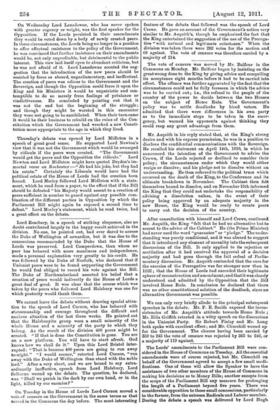After consultation with himself and Lord Crewe, continued Mr. Asquith,
the King "felt that he had no alternative but to assent to the advice of the Cabinet." He (the Prime Minister) had never used the word "guarantee" or "pledge." The under- standing was purely conditional, and it was absurd to suggest that it introduced any element of unreality into the subsequent discussions of the Bill. It only applied to its rejection or mutilation after it had received the approval of a decisive majority and had gone through the full ordeal of Parlia- mentary discussion. Mr. Asquith contended that the case for the exercise of the Prerogative was far stronger now than in 1832 ; that the House of Lords had exceeded their legitimate sphere of reconstruction and amendment; and that it was clearly understood and admitted by the Opposition that the Bill involved Home Rule. In conclusion he declared that there was no other constitutional solution of the deadlock, since no alternative Government was possible.


































 Previous page
Previous page